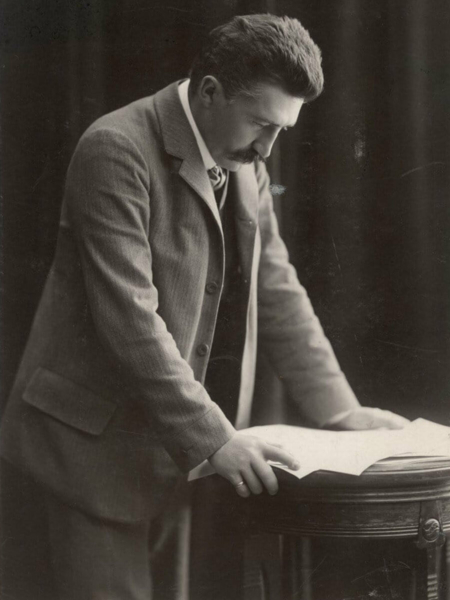Josef Suk (1874–1935)
Josef Suk hat ein nur schmales Oeuvre vorzuweisen. Mit diesen wenigen Werken profiliert er sich aber bis heute erfolgreich auch an seinem Schwiegervater Antonín Dvorák vorbei, dessen Tod das Entstehen der großen Asrael-Symphonie beeinflusste.
Josef Suk wurde als Sohn eines Dorfschullehrers und Chorleiters in Krecovice geboren. Mit acht Jahren erhielt er den ersten Violinunterricht, und als Elfjähriger war er bereits Schüler des Prager Konservatoriums, wo er seit 1891 von Antonín Dvorák in der Komposition ausgebildet wurde. Bald schon war er der Lieblingsschüler seines berühmten Lehrers und ein gern gesehener Gast im Hause Dvorák, wo er nicht nur musikalischer Ratschläge wegen ein- und ausging: Otilie (Otylka), die älteste Tochter der Dvoráks, war zwar erst vierzehn Jahre alt, doch die ersten zarten Bande erwiesen sich als so haltbar, dass sie auch den US-Aufenthalt der Dvoráks (1892 bis 1895) überdauerten.
Die Wartezeit hatte Josef Suk zu einem bedeutenden Karriereschritt genutzt: Als Sekundgeiger bildete er mit Karl Hoffmann, Oskar Nedbal und Otto Berger das „Céske kvartet“, das während der nächsten vier Jahrzehnte die internationale Kammermusiklandschaft erheblich mitbeeinflussen sollte. Die Liebe zu Otylka war indessen nur noch gewachsen, und die Schwiegereltern in spe richteten es so ein, daß ihre Tochter am selben Tag im November 1898 getraut wurde, an dem die beiden Alten ihre Silberhochzeit feierten.
Josef Suk war 24 Jahre alt, konnte auch als Komponist gerade die ersten Sporen verdienen, hatte mit seiner Streicherserenade Es-dur op. 6 unwissentlich einen Evergreen geschaffen, geigte emsig im Quartett, arbeitete fleißig an neuen, jugendlich-ambitionierten Stücken wie der Symphonie E-dur op. 14 und war ganz offenbar Teil eines harmonischen Ganzen, das man tatsächlich als beinahe perfekt bezeichnen konnte. Doch mit 30 Jahren verlor er den verehrten Schwiegervater, und gerade einmal vierzehn Monate später, am 6. Juli 1905, war er Witwer. Das chronisch schwache Herz seiner geliebten Otylka hatte den Dienst versagt.
Suk war allein. Und er blieb es bis zu seinem Lebensende. Zwei Jahre vor seinem Tod verabschiedete er sich 1933 dann vom zweiten Pult seines Quartetts, als er ein zweites Mal die Direktion des Prager Konservatoriums übernahm, wo er schon seit längerem als Professor für Komposition tätig gewesen war.
Josef Suk starb am 29. Mai 1935. Und beinahe 70 Jahre nach dem Tode des Komponisten stellt sich uns eine äußerst bemerkenswerte Situation dar: Einerseits ist auf Tonträgern fast alles dokumentiert, was er im Laufe seines Lebens geschaffen hat, andererseits beschränkt sich bis heute das wesentliche Schrifttum zu höchsten Anteilen auf jene fremde, mit Haken und Ösen versehene Sprache, die nur wenige Europäer von Kindesbeinen an lernen. Da entsteht viel Raum für Kolportagen, und in den Einführungstexten feiert die Kunst der geschickten Kopie fröhliche Urständ: Niemand, der auch nur ansatzweise versucht hätte, Josef Suk zumindest probeweise aus dem üblichen Bezugsrahmen seiner Zeitgenossen zu entfernen, ihn also nicht zwanghaft an Sibelius, Strauss, Mahler, Schönberg, Schreker, Janácek oder Bartók zu messen und ihm in einer Art historischer Dimensionsverschiebung einmal die Rolle eines Individuums zuzuweisen, dessen Existenz durch sich selbst definiert wird.
(Eckardt van den Hoogen, aus dem Booklet zu „Josef Suk - Asrael Symphony“, CD cpo, 2004)









